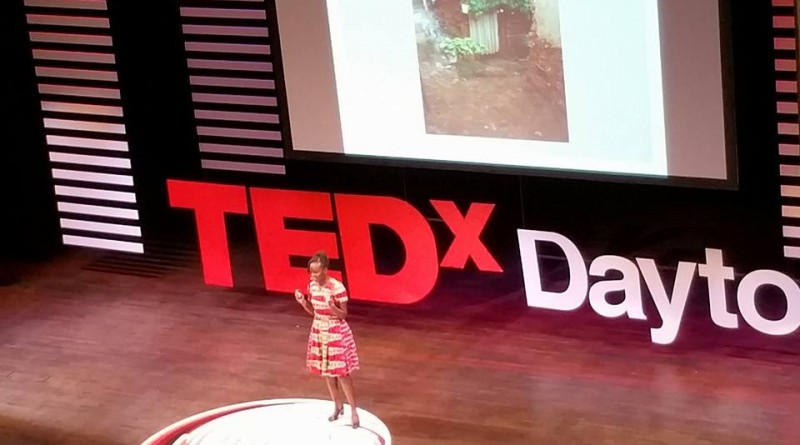On the TED stage: UD staff member talks childhood, community poverty
By: Rachel Cain – News Editor
When Harriet Brown took to the stage at TEDx Dayton Oct. 16, she wore a brilliantly colored African dress made by a woman from a Kenyan slum, a testament to her own upbringing. Brown, recently retired from her position as international student advisor at UD, discussed growing up in the Kenyan slum Kibera and how messages instilled in young people living in poverty can dramatically change their futures.
“I see the TED stage as not for just my story, but for people who are still in Kibera who have never had their story told otherwise,” Brown said in an interview with Flyer News. “I’m hoping I will honor them.”
Brown recently had the opportunity to volunteer with some young people in Dayton, which made her consider how she managed to escape poverty. Her TEDx talk compared her experience in Kibera with those of young people in low-income communities in the U.S.
“It’s a different kind of poverty, even though they’re in the richest country in the world,” Brown said. “You have extreme financial poverty in Kibera, but there is also poverty of community here—and that sometimes can have even more lasting effects. You can get out of [financial] poverty, but getting out of that mentality that your community gives you is even harder.”
Brown applied for TEDx Dayton last May. She was not confident her audition performance had gone well and was ecstatic when she received an email in June saying she’d been selected as a speaker.
“I looked at what [children in low-income communities] were going through and I compared it to how I grew up and what made me somehow succeed in life in spite of my circumstances,” Brown said. “I thought the TED stage would be a great opportunity for me to share my thoughts about this particular subject.”
She believes the implicit messages children receive play a defining role in their ability to escape poverty. Brown says these messages are what made the difference for her.
As a child, she had a family friend who made mats. When Brown confided in the woman that she wanted to grow up and make mats like her, her friend replied, “Oh no, you can do even better. You need to go for a higher goal.”
“She encouraged me,” Brown explained.
Brown worries that children in America do not receive this same inspiration and support from the people around them.
“It’s not so much the money that they need—they need someone to believe in them. I think that society sends messages sometimes to children without realizing that they’re sending a message to them that they’re only meant to go so far because of your disability or because of your socio-economic status,” Brown said. “The implicit message I received from my community made a huge difference in my life.”
Although Brown said she does not commonly share her experiences about her childhood in Kibera with others, she discussed it more frequently while preparing for her TED talk.
“People are usually very surprised,” she said.
During her presentation, Brown knew she could rely on the familiar faces in the audience for support. Her husband, a friend from church and a past classmate were all in attendance.
Brown said her mother back in Kenya is looking forward to watching the TED talk online.
Brown hopes the lasting message her audience remembers from her presentation is “to be careful about what we are putting in our children’s minds. It’s not fair for the children to have their future taken away from them by the message given to them.”
She also hopes UD students can learn from her talk and work more with people living in poverty either in the Dayton community or abroad. She explained these opportunities are available through the Fitz Center and Campus Ministry.
“Remember to think long term, in terms of helping the child realize that they have something in them and that they can aim for the stars, that they can do it,” Brown said.
She explained that growing up in poverty does not have to lead to a negative life experience.
“If I could do my life all over again, I would still grow up in Kibera,” Brown said.
TED is a nonprofit dedicated to holding conferences where speakers give brief presentations regarding “ideas worth spreading.” A TEDx event is an independently organized “TED-like experience,” according to TEDx Dayton’s website.
“The TEDx Dayton experience was so amazing,” Brown wrote in an email to Flyer News following the event. “I will treasure the experience for a long time. I was inspired by all the speakers to re-think how I view ideas. The presenters were so powerful—what an honor to be on stage with them!”
Oct. 15 was Brown’s last day at UD. She is currently in Washington, D.C., training for her new job with the Department of Homeland Security.
Photo by Rachel Cain.

